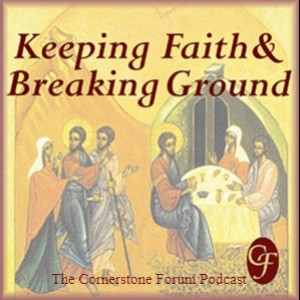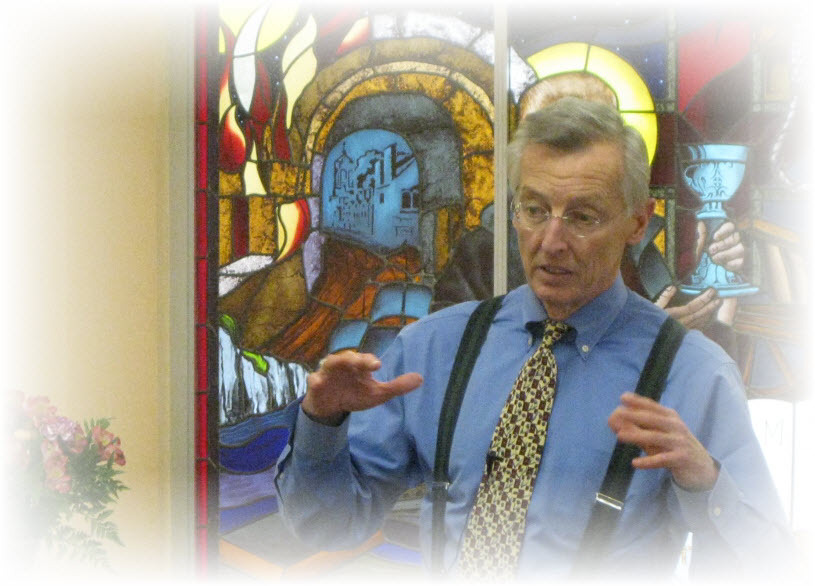Episodes

Saturday Feb 19, 2022
Saturday Feb 19, 2022
Reading the Bible is like looking out of a window and seeing a crowd out in the street shading their eyes and gazing with intense interest at something that we can't see because of the roof of the building from which we're peering out. They gesture and they point and they speak in a language we can't decipher. They are very excited about something. Something is happening or is about to happen, but what is it? - Karl Barth
This four part series takes the listener through an often imaginative overview of some of the most significant biblical stories. Using aspects of René Girard's mimetic theory as an interpretive lens through which to see the dynamics of the stories in both anthropological and theological perspectives.

Friday Feb 18, 2022
Friday Feb 18, 2022
Reading the Bible is like looking out of a window and seeing a crowd out in the street shading their eyes and gazing with intense interest at something that we can't see because of the roof of the building from which we're peering out. They gesture and they point and they speak in a language we can't decipher. They are very excited about something. Something is happening or is about to happen, but what is it? - Karl Barth
This four part series takes the listener through an often imaginative overview of some of the most significant biblical stories. Using aspects of René Girard's mimetic theory as an interpretive lens through which to see the dynamics of the stories in both anthropological and theological perspectives.

Thursday Feb 17, 2022
Thursday Feb 17, 2022
Reading the Bible is like looking out of a window and seeing a crowd out in the street shading their eyes and gazing with intense interest at something that we can't see because of the roof of the building from which we're peering out. They gesture and they point and they speak in a language we can't decipher. They are very excited about something. Something is happening or is about to happen, but what is it? - Karl Barth
This four part series takes the listener through an often imaginative overview of some of the most significant biblical stories. Using aspects of René Girard's mimetic theory as an interpretive lens through which to see the dynamics of the stories in both anthropological and theological perspectives.

Wednesday Feb 16, 2022

Tuesday Feb 15, 2022

Monday Feb 14, 2022

Sunday Feb 13, 2022
Sunday Feb 13, 2022
The modern crisis of the person in the West is the focus of Gil Bailie’s 1990 Reflections on Authur Miller’s Death of a Salesman. Though written in the late 1940’s the story of Willy Loman’s life reads like a classical Greek tragedy, however without the protagonist ever coming to the knowledge of his fatal flaw. Mr. Bailie’s analysis displays his then recent exposure to René Girard’s mimetic theory bringing anthropological as well as psychological and spiritual insights to the text.
“The more people think they are realizing the utopias dreamed up by their desires, the more they will in fact be working to reinforce the competitive world that is stifling them.” – René Girard

Saturday Feb 12, 2022
Saturday Feb 12, 2022
The modern crisis of the person in the West is the focus of Gil Bailie’s 1990 Reflections on Authur Miller’s Death of a Salesman. Though written in the late 1940’s the story of Willy Loman’s life reads like a classical Greek tragedy, however without the protagonist ever coming to the knowledge of his fatal flaw. Mr. Bailie’s analysis displays his then recent exposure to René Girard’s mimetic theory bringing anthropological as well as psychological and spiritual insights to the text.
“The more people think they are realizing the utopias dreamed up by their desires, the more they will in fact be working to reinforce the competitive world that is stifling them.” – René Girard

Friday Feb 11, 2022
Friday Feb 11, 2022
The modern crisis of the person in the West is the focus of Gil Bailie’s 1990 Reflections on Authur Miller’s Death of a Salesman. Though written in the late 1940’s the story of Willy Loman’s life reads like a classical Greek tragedy, however without the protagonist ever coming to the knowledge of his fatal flaw. Mr. Bailie’s analysis displays his then recent exposure to René Girard’s mimetic theory bringing anthropological as well as psychological and spiritual insights to the text.
“The more people think they are realizing the utopias dreamed up by their desires, the more they will in fact be working to reinforce the competitive world that is stifling them.” – René Girard

Thursday Feb 10, 2022
Thursday Feb 10, 2022
Gil Bailie’s 1994 series entitled the Dionysian Revival examines the 5th century BC Greek drama The Bacchae by Euripides as well as the 20th century novel Lord of the Flies by William Golding. It is interesting to note that The Bacchae reflects aspects of the historical reality of Athens in the period it was performed. In the decades prior to the drama’s premier in Athens, the city had been ravaged by both war and pandemic causing great social upheavals and was accompanied by a revival of primitive ecstatic Dionysian religious rites. Euripides’ play exposes the powerful forces behind the seemingly benign god of wine, ecstasy and drama. The same forces that Fredrich Nietzsche and Richard Wagner celebrated in their respective works over two millennia later and have been ascendant in the West ever since. As an example of these influences the movie Cabaret, based on Christopher Isherwood’s Berlin Stories, is profiled.
In Lord of the Flies William Golding imaginatively explores how a group of British schoolboys stranded on an uninhabited island with no adults during a time of war might organize themselves. Golding’s anthropological assumptions, without any influence from René Girard, show the power of sacrifice and the sacred in the incipient society around which the boys coalesce.

Keeping Faith & Breaking Ground
Without Christianity neither the nature of the present crisis of culture nor the meaning of history itself can be properly comprehended. If the Christian revelation is to come to our aid in this moment of peril, we must learn to account for its sweeping claims in ways that are faithful to Church teachings, intellectually cogent, morally rigorous, charitable, anthropologically sound, and undeterred by the moribund spirit of our age.



